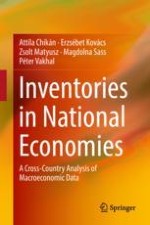2018 | OriginalPaper | Chapter
6. Inventory Developments in Individual Countries
Authors : Attila Chikán, Erzsébet Kovács, Zsolt Matyusz, Magdolna Sass, Péter Vakhal
Published in: Inventories in National Economies
Publisher: Springer London
Activate our intelligent search to find suitable subject content or patents.
Select sections of text to find matching patents with Artificial Intelligence. powered by
Select sections of text to find additional relevant content using AI-assisted search. powered by
